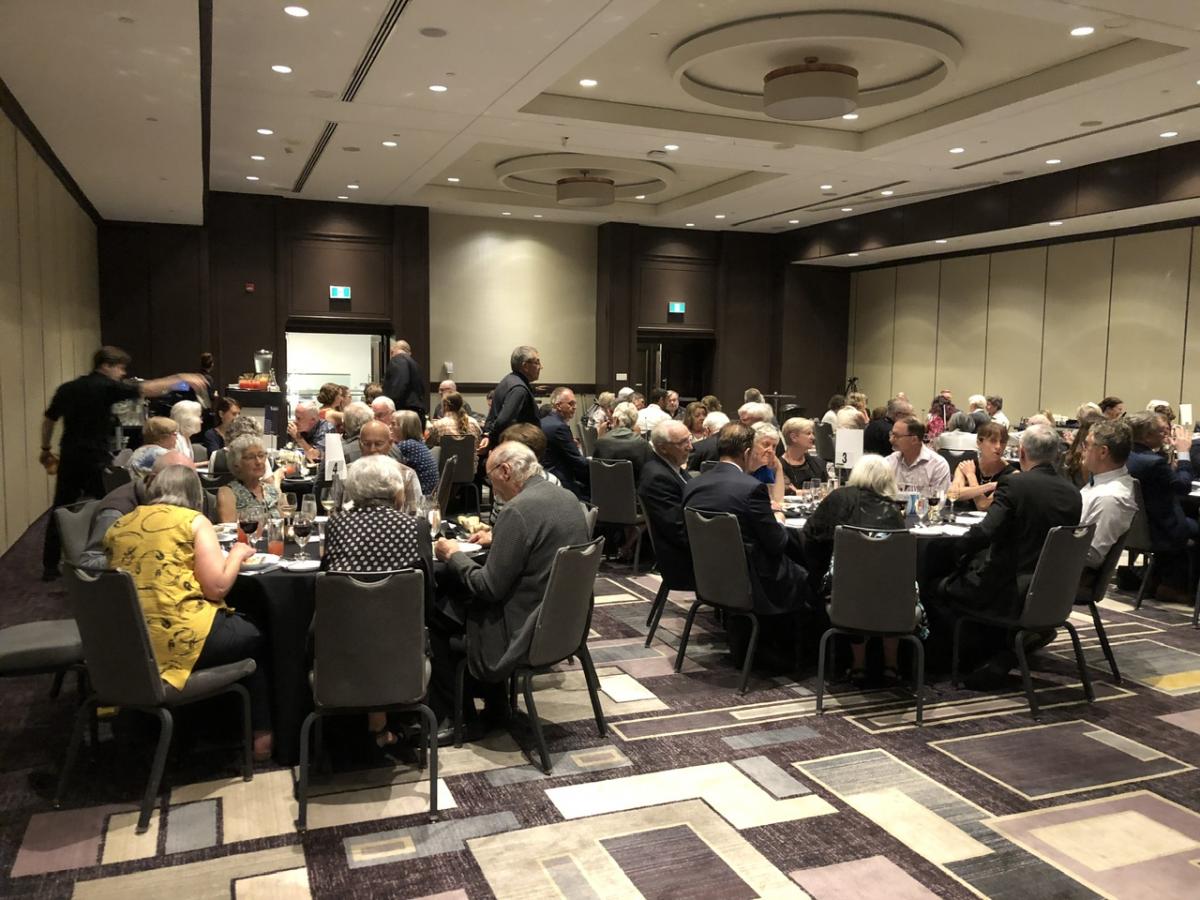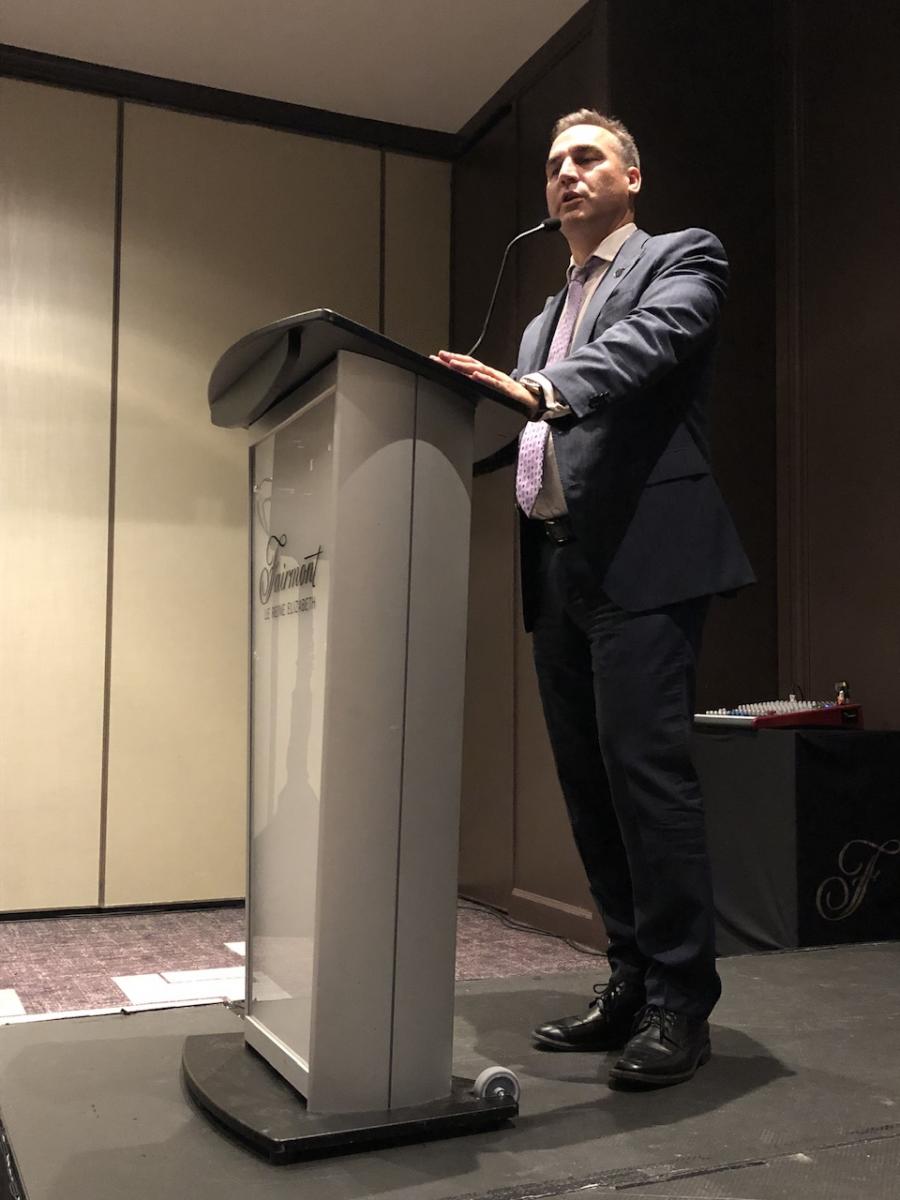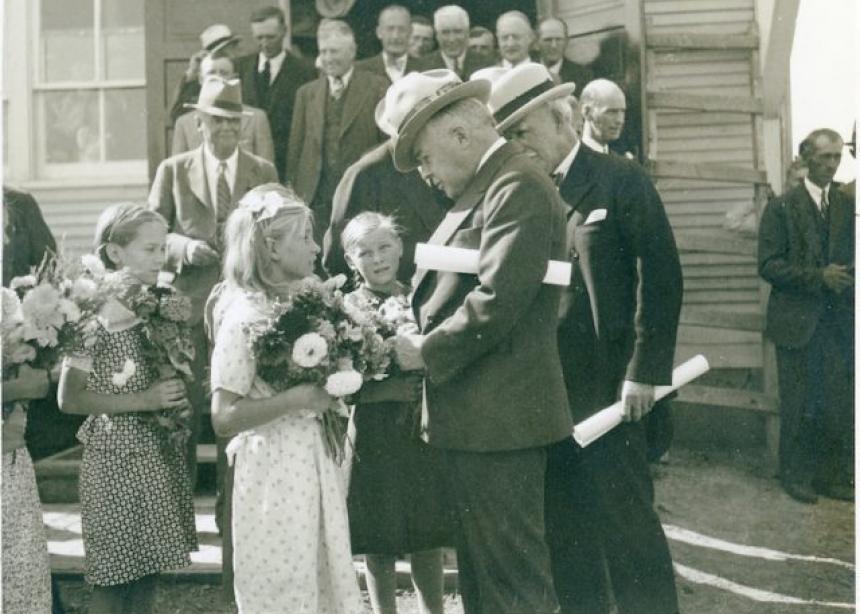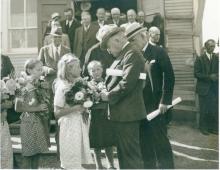The story of Mennonites coming to Canada from the Soviet Union between 1923 and 1930 is about hope and faith.
It’s also about money. $1,767,368.68 to be exact.
That’s what Aileen Friesen said July 8 in Montreal at a celebration to acknowledge the role the Canadian Pacific Railway (now Canadian Pacific Kansas City) played in bringing Mennonites to Canada 100 years ago.

“We are here tonight to pay tribute to a moment in history special to both Mennonites and the former Canadian Pacific Railway,” said Friesen, co-director and associate professor with the Centre for Transnational Mennonite Studies at the University of Winnipeg and part of the organizing committee for “Memories of Migration: Russlaender Tour 100.”
Noting the railway loaned Mennonites “a lot of money” so they could come to Canada, she went on to say the story was also “about more than money. This is a tribute to the lives saved through this loan, the second chance given, the generations created, the contributions to Canadian society made.”
“After years of tragedy, after a civil war that confirmed humanity’s inhumanity, after a famine that swelled the bellies of children and after an epidemic that filled cemeteries, Mennonites carried scars, both seen and unseen,” she said of those who boarded CPR ships and trains to journey to new homes in a new country.
In particular, the CPR made a difference in the lives of the many children who accompanied their parents to Canada, saving them “from the Soviet deportations still to come, from another famine, from the fate of losing their fathers through terror, from living through another devastating war,” Friesen said.
The railway “gifted these children a future, which was not without its own challenges, without its own sacrifices.”
The railway also made it possible for the immigrants to create a “strong foundation for future generations,” including many of the 100 or so people in the room for the celebration, 60 of them participants on the first leg of the “Memories of Migration” tour.
“This is what the loan from the CPR made possible,” Friesen said. “This is the legacy that we are here to commemorate.”
She noted not everyone in the CPR was in favour of loaning the funds to the Canadian Mennonite Board of Colonization for the immigrants.
Friesen credited Colonel John Stoughten Dennis with persuading others at the railway to loan the money, including one vice president who described it as one of Dennis’ “crazy ideas.”
Some Canadian Mennonites also questioned the wisdom of the contract, considering the requirement to pay six percent interest and follow a stringent repayment plan.
For them, Friesen said, the plan “demonstrated fiscal recklessness,” with some raising concerns about the judgement of Bishop David Toews, who spearheaded the plan from the Mennonite side.
“They weren’t wrong,” Friesen said. “This was a bad deal, and Toews knew it. For him, it was lives, not money, that held more sway. The cost of inaction far outweighed the burden of debt.”
With support from only part of the Canadian Mennonite community, Toews signed the contract, effectively starting the migration movement of Mennonites from the Soviet Union to Canada.
Moving that many people across the ocean and then across Canada was not “straightforward or uncomplicated,” Friesen said, noting the Mennonite Heritage Archives has “stacks of correspondence” about a “succession of crises” involving the trips.

“Every train travelling across Canada with Mennonite passengers represented a hard-fought victory,” she said, involving outbreaks of disease, spats between Soviet Union and Canada officials over visas, changes to Soviet protocols, and border officials who strictly interpreted Canadian regulations.
All these things “created a constant flow of problems requiring patience,” Friesen said.
Dennis, “ever the steady hand,” continued to support this project despite its many obstacles.
“During tense moments of conflict between the Board and the CPR, and there were many, he calmly defused the situation, often reminding Mennonites that they were not the only ones with integrity,” Friesen said.
Dennis also had to reprimand Mennonites on a number of occasions, she said, “even halting the flow of immigrants until Mennonites could find more funds to lower their debt.”
But instead of shutting down the enterprise, the CPR “continued to extend credit as fast as Mennonites could make repayments,” she said.
In 1937, Mennonites in Coaldale, Alberta held a celebration, much like the one in Montreal in 2023, to thank the CPR and Dennis.
As Mennonite church leader B.B. Janz put it then: “Not just one generation was saved, but also their children and the generations to come. In the midst of a world full of suspicion and ill will, the act of trust on the part of the Canadian Pacific Railway, which they have shown towards our people in recent years, will be outstanding for all times.”
Of Dennis, Janz said his work on behalf of Mennonites from the Soviet Union was “an act of Christian charity unequalled in the history of today.”
While not forgetting how Indigenous people were displaced by Mennonites and other settlers who came to Canada a century ago, “we can be eternally grateful to the CPR for the deliverance of our parents, grandparents and great-grandparents,” Friesen said.
Without its help, “many of us would not exist . . . we can honour this deliverance by remembering the full story, learning from the past to forge our future.”
In response, Jason Ross, vice president for operations of the eastern region of Canadian Pacific Kansas City, said he was “humbled” to acknowledge the work of his predecessors at the railway. “Because of them, the company is what it is today,” he said.
The celebration, held at the Queen Elizabeth hotel in downtown Montreal, also featured music by Karl Stobbe, violin, Godwin Friesen, piano and Karis Wiebe, soprano.
John Longhurst is a freelance writer from Winnipeg who is blogging about the tour.
Read John's previous posts about the tour:
MoM 100: Not your grandparents’ railway journey
MoM 100: A visit to Grosse Isle
MoM 100: Ukraine’s past, present come together
MoM 100: How the CPR helped Mennonites
Train tour prepares to leave the station



Add new comment
Canadian Mennonite invites comments and encourages constructive discussion about our content. Actual full names (first and last) are required. Comments are moderated and may be edited. They will not appear online until approved and will be posted during business hours. Some comments may be reproduced in print.